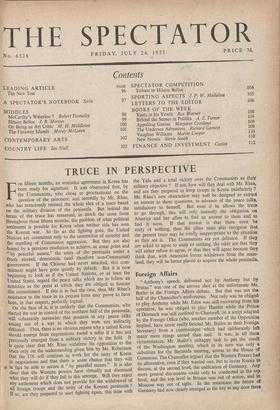TRUCE IN PERSPECTIVE
On the face of it, it is unlikely that the Communists, who started the war in control of the northern half of the peninsula, will voluntarily surrender that position in any peace talks arising out of a war in which they were not militarily defeated. Thus, there is no obvious reason why a united Korea should emerge from negotiations round a table if it has not previously emerged from a military victory in the field. It is quite clear that Mr. Rhee withdrew his opposition to the truce only on the understanding given him by Mr. Robertson that the UN will continue tct work for the unity of Korea in negotiations And that there is some chance that they will • in fact be able to secure it " by peaceful means." It is also clear that the Western powers have virtually not discussed what they will do if they fail in this attempt. Will they reject any settlement which does not provide for the withdrawal of all foreign troops and the unity of the Korean peninsula ? If so, are they prepared to start fighting again, this time with the Yalu and a total victory over the Communists as their military objective ? If not, how will they deal with Mr. Rhea, and are they prepared to keep troops in Korea indefinitely ? Mr. Rhee's new obstruction may well be designed to extract an answer to these questions, in advance of the peace talks, satisfactory to himself. But even if he allows the truce to go through, this will only intensify the obligation on America and her allies to find an' answer to them and to find it soon. If that answer' is that there must be unity or nothing, then the allies must also recognise that the present truce may be totally inappropriate to the situation as they see it. The Communists are Snot defeated. If they are asked to agree to unity or nothing, the odds are- that they will either refuse to agree, or that they will agree because they think that, with American forces withdrawn from the main- land, they will be better placed to acquire the whole peninsula.


























 Previous page
Previous page